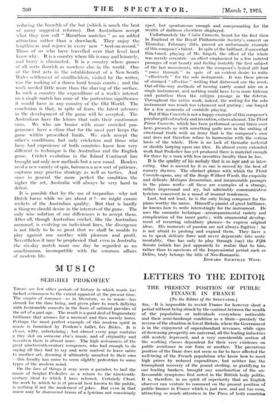USIC
SERGHEI PROKO.FIEV
THERE are few other periods of history in which music has lacked seriousness to the extent apparent at the present time. The empire of romance—as in literature, so in music—has shrunk for the time being, and given place to much dallying with fashionable conceits in the form of satirical parodies of the art of a past age. The result is a good deal of fragmentary brilliance that amuses for a moment and then merely bores. Perhaps the most perfect example of this modern spirit in music is furniShed by Poulenc's ballet, Les Riches. It is clever, witty, entertaining ; but almost every page contains a tiny skit on someone else's music, and of originality and invention there is almost none. The high seriousness of the great nineteeenthcentury composers, who had enough to do saying all they had to say and were content to leave satire to another art, deeming it ultimately unsuited to their own —this faculty has come to seem slightly pedestrian to some types of the modern mind.
On the face of things it may seem a paradox to hail the music of Scrghei Prokofiev as a return to the nineteenth. century ideal to which I have referred. Certainly Chout, the work by which he is at present best known to the public, is nothing if not the modernest of jokes. But even in that music may be discovered traces of a lyricism- not conseidusly
aped, but spontaneous enough and compensating for the wealth of dullness elsewhere displayed.
Unfortunately the 1" iolin Concerto, heard for the first time in England at the Royal Philharmonic Society's concert on Thursday, February 26th, proved an unfortunate example of this con:wow:is talent. In spite of the brilliant, if somewhat thin-toned, playing of Mr. Szigeti, the effect of the whole was merely eccentric—an effect emphasized by.a few isolated passages of real beauty and feeling (notably the first. subject of the last movement), where the composer's lyrical gift had " come through " in spite of an evident desire to write " effectively " for the solo instrument. It was these pieces of strained "effective " writing that distressed one the most. Out-of-the-way methods of bowing rarely sound nice on a single instrument, and nothing could have Leen more hideous and pointless than the collegno passage in the Scherzo. Throughout the entire work, indeed, the writing for the solo instrument was much too vehement and grating ; one longed for a few moments of cantabile playing.
But if this Concerto is not a happy example of this composer's peculiar gifts of melody and invention, others abound. The Third Piano Concerto, which has been performed several times over here, presents us with something quite new in the uniting of emotional truth with an irony that is the composer's own and does not therefore refuse to harinonize with the serious basis of the whole. Here is no lack of thematic material or shoddy harping upon one idea. In almost every extended work that Prokofiev has yet produced there is material enough for three by a man with less inventive faculty than he has.
It is the quality of his melody that is so ntw and so inter- esting. One is moved by it as one is moved by the best of nursery rhymes. The clarinet phrase with which the Third Concerto opens, any of the Songs Without Words, the exquisite and delicate Malayan Incantation, and innumerable passages in the piano works—all these are examples of a strange, rather impersonal and icy, but admirably communicative lyricism conceived in a mood of ironical tenderness.
Last, but not least, he is the only living composer for the piano worthy the name. Himself a pianist of great brilliance, he knows how to write interestingly for the instrument. He uses the romantic technique—aceompanimental variety and complication of the inner parts ; with ornamental develop- ment of recurring subsidiary phrases--to express original ideas. His moments of passion are not always fugitive : he is not afraid to prolong and expand them. They have a so to speak delicate force and never degenerate into senti- mentality. One has only to play through (say) the Fifth Sonata (which has just appeared) to realize that to him, rather than to survivors of the Impressionist period such as Delius, truly belongs the title of Neo-Romantic.
EDWARD SACKVILLE WEST.


























































 Previous page
Previous page